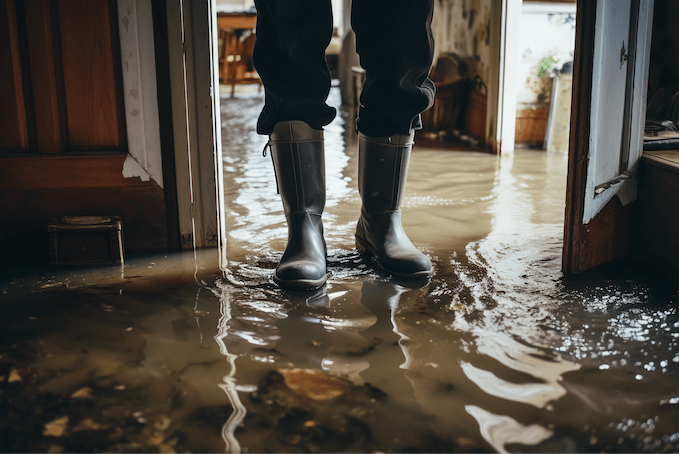
New England: Safeguard Your Home from Water Damage
Safeguard Your Home from Water Damage
The impact of autumn storms in New England can vary greatly depending on their intensity and track, and many bring lots of rain this time of year. Some may bring light rain and strong winds, while others can cause widespread flooding and destruction. Homeowners need to be prepared for the potential damage caused by these storms.
Understanding the Risks of Water Damage
Water damage is one of the most common and costly disasters that homeowners face. It can be caused by natural disasters such as hurricanes, heavy rainfall, flooding, or internal issues like burst pipes and leaky roofs. Regardless of the cause, water damage can devastate your home and personal belongings if not appropriately addressed.
Inspect Your Home for Vulnerabilities
During New England’s wet season, it is crucial to safeguard your home from potential water damage. One of the most important steps in protecting your property is identifying any vulnerabilities that may make it more susceptible to flooding or leaks.
- Check for cracks and openings in the foundation: Your home’s foundation plays a critical role in keeping water out. It is essential to regularly inspect the foundation for any cracks or gaps that may allow water to seep in during heavy rains or floods. Seal any openings with caulk or concrete patching material to prevent water from entering.
- Examine windows and doors: Windows and doors are common entry points for water, especially if they need to be properly sealed. Check all windows and doors for gaps or cracks where water could enter and use weather stripping or caulking to seal them off.
- Inspect the roof: A damaged roof can be a major cause of water damage during storms. Regularly check your roof for missing or damaged shingles, clogged gutters, and downspouts, which can lead to excess water pooling on the roof. Consider hiring a professional roofer to fix any issues before they turn into costly repairs.
- Look at pipes and plumbing fixtures: Leaky pipes can cause significant damage over time, so it’s crucial to inspect all visible pipes regularly for signs of wear or leaks. Also, check under sinks and
Create a Plan and Emergency Kit
Create an emergency plan for your family. This should include who to contact in an emergency, where to meet if you get separated, and how to shut off utilities such as gas, electricity, and water.
- Ensure everyone in your household knows this plan and what to do when a storm hits. Practice drills every few months so that everyone is familiar with the procedures.
- Prepare an Emergency Kit: An essential part of any emergency plan is always having an emergency kit ready. This kit should include basic supplies that can help you survive for at least three days without power or access to outside help.
Your emergency kit should contain items such as non-perishable food items, bottled water, flashlights with extra batteries, a first aid kit, essential medications, important documents (insurance papers, identification cards), cash, and
Invest in Proper Drainage Systems: French Drains
French drains are a type of trench drain that is designed to redirect water away from your home’s foundation. They consist of a perforated pipe surrounded by gravel or rock and are covered with a layer of soil or grass. The pipe collects excess water and redirects it away from your home, preventing it from pooling around the foundation and potentially causing damage.
- Prevents water accumulation: During heavy rainstorms, the ground may become saturated with water, leading to puddles and even flooding. This excess water can seep through cracks in your foundation or basement walls, causing structural damage and mold growth. French drains help prevent this by redirecting the water away from your home’s foundation.
- Protects landscaping: Excess water around your home can also harm your landscaping by drowning plants and eroding soil. French drains help keep the moisture levels balanced around your property, protecting both your house and yard.
- Minimizes erosion: Heavy downpours can cause significant erosion on sloped properties without proper drainage systems.
Utilize Plants that Absorb Water
Plants play a crucial role in managing excess water on your property. They can absorb large amounts of water through their roots, preventing it from seeping into the ground and potentially causing flooding or foundation damage. Here are some types of plants that are particularly efficient at absorbing water:
- Rain Gardens – These are specifically designed gardens with deep-rooted plants that can soak up excess rainwater before it flows into nearby drains. They act as natural sponges, reducing the risk of flooding in your yard or basement.
- Native Plants – Native plants are well-adapted to the local climate and soil conditions, making them more resilient to extreme weather events like heavy rainfall. Some examples of native plants in New England include black-eyed Susans, asters, and ferns.
- Trees – Large trees with deep root systems can also help absorb excess water and prevent erosion on sloped areas. Planting trees strategically around your property can also provide shade and reduce heat absorption, which can help regulate moisture levels in the soil.
- Shrubs and Ground Cover – Shrubs such as hydrangeas or rhododendrons have extensive root systems that make them excellent at soaking up moisture from the ground. Ground covers like creeping
Keep Gutters Clean and Functional
Gutters are crucial in directing water away from your home’s foundation, preventing flooding and water damage. However, they cannot perform their job effectively if they are clogged or damaged. It can lead to overflowing gutters, which can cause water to seep into your home’s structure.
- Regularly clean out debris: Leaves, twigs, and other debris can easily get trapped in your gutters, especially during the fall when trees shed their leaves. It’s essential to regularly clean out this debris as it can quickly accumulate and clog up your gutters. You can use a ladder or hire a professional gutter cleaning service to do this for you.
- Install gutter guards: Gutter guards are screens covering the top of your gutters and preventing debris from entering while allowing water to flow through. They are an excellent investment for homeowners who want to minimize the maintenance required for their gutters.
- Check for any damages: During heavy storms, gutters can become damaged by strong winds or falling tree branches. It’s crucial to inspect them regularly for any cracks,
Know When to Call a Professional
It is important to know when to call in the professionals. Trying to handle certain situations on your own may lead to more significant and costly problems. Here are some scenarios where it’s best to leave it to the experts:
- Major Flooding: If your home experiences major flooding, whether from a storm or a burst pipe, it’s crucial to call a professional right away. They have the necessary equipment and expertise to remove large amounts of water quickly and effectively. Attempting to do this alone can be dangerous and may result in further damage.
- Mold Growth: If you notice mold growth in your home, especially after a flood or water leak, it’s essential to call a professional mold remediation service. Mold can spread quickly if not properly treated, leading to health hazards for you and your family.
- Electrical Issues: Water damage often goes hand in hand with electrical issues. If you experience any flickering lights, sparks, or other signs of electrical problems after water damage, do not attempt to fix them yourself. Instead, call an electrician who is trained and experienced in dealing with these types of situations.
- Structural Damage: Water damage can weaken the structural integrity of your home if left untreated. If you notice any cracks in walls or ceilings, sagging floors.
Protecting your home from water damage essential to maintaining its structural integrity and preventing costly repairs. By following these essential tips, you can safeguard your home and give yourself peace of mind during the unpredictable weather conditions. It is a great time to review your insurance policy coverage.
Safety Northeast Insurance provides home owners insurance, flood insurance, and business owners insurance. If you are interested in review of your current policy, receiving a competitive quote or have any questions give us a call at (800) 443 7007.

 Previous Post
Previous Post Next Post
Next Post